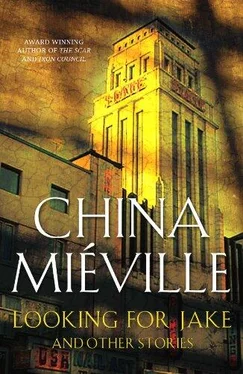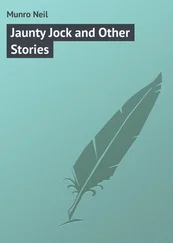But they had not saved him, of course. He had not been in danger, unlike them. And what came to Sholl was that forcing him to go—as he had thought—alone, had proved to him that he could, which he had not been sure of, at all. He had not wanted to test it, but had been given no choice. And now that he knew he did not need the soldiers, they wanted him.
What—would he turn them away, now? Of course not.
Thinking about what had yet to be done (as he turned absentmindedly on his toes, with a beer and sandwich in his hands, dancing with one of the women) Sholl considered that he did not know everything he would face. The piratical last Londoners themselves, let alone the imagos. And perhaps whatever it was that kept him safe would ebb. Perhaps there would be imagos he had never faced before, that would touch him.
There were other thoughts, too, other reasons that he felt he needed the company to be with him, but they were very faint and hard to read, and he did not consider them deeply. All around, he could hear conversations about himself.
“Motherfucker went for them and they ran!”
“ He wasn’t scared, they were scared! ”
“...wouldn’t touch him...
“...fucking straight past them...
“They wouldn’t touch him.”
Sholl knew what was happening to him, in the eyes of the soldiers; he could see the transformation. They tried not to stare. They looked at him obliquely, but he could see their expressions. They were jealous—some so much that it was all they could feel. But for most of them, their awe was more powerful.
He did not like it, and became all the more profane in his words and his louche dancing, but he knew that he could not erase the feeling in them, that it was too formless and wordless to be countered (they would deny anything put to them, that came close to stating it). And besides, he needed it. He had counted on it. But that did not make it good to bear.
Sholl could command the army unit now, and they would obey him. He knew he should not tell them too much, that unspoken and secret things were important to their construction of him, but his discomfort with their barely hidden reverence made him talkative.
He told the CO that they would go south, loud enough for the soldiers to hear. He used tones that could just have been suggestive, so that the officer himself could turn around and make the orders. Sholl pretended to think himself only an advisor. Everyone was complicit in this.
They never asked him how he knew where to go. He had gone into the underworld, and come out bloodied, with the knowledge. He grimaced at the theatrics of it.
Sholl never explicitly announced their goal, but by inexorable rumour, it was less than a day before all the soldiers had some half-understanding, some inchoate knowledge of where they were going and why.
They knew that something waited for them, and that they were coming for it, as guerrillas. Sholl did not try to find out what they thought they would find. Their excitement was enough for him. He had them doing something, and they were giddy on it.
They knew that the journey they were about to make was deadly, and that some of them would likely die. They were heading toward London’s terrible heartlands, into the streets. They would set off early, and if they made Camden Town, just over two miles south, by nightfall, Sholl would be satisfied. That would be halfway. Then the same the next day, and they would find their target, and enter by darkness.
That was the plan.
Beyond a certain number they would be a liability, but the process of elimination was difficult. There were too many volunteers for the mission, and men and women designated to stay, to care for refugees and keep camp, were livid, and would not listen to mollifying nonsense about it being the most important job of all. But eventually—Sholl stayed away from the process—the unit was chosen. Three vehicles, each carrying six soldiers. Some tripod-mounted guns, a rocket launcher, a handful of grenades. Sholl, the commander, twelve men and four women. Most had been professional soldiers, and the others were young and tough. It was an elite unit. Strapped in what body armour and weapons they had. With a nameless emotion, Sholl decided he would not learn their names.
The jeeps set out at six in the morning, breaking out of the trees, with the whole camp lined up to wave them off. Sholl had watched carefully and unobtrusively, while he gathered the things he had brought: almost none of those who were coming made long good-byes. They patted friends and lovers brusquely, as if they were on another quick recce.
When it came to Sholl to take his leave, he turned and took in the mucky clearing, with its washing and cooking, its dingy tents, the refugees, the soldiers ersatz and trained. They were all watching him. He raised his hand very slowly, turning to take in every face he saw. You will not see me again, he thought.
He could tell that they knew.
That first day, Sholl saw that his escort was perhaps indispensable after all. The route they had picked out was dangerous. The alternatives were worse: Primrose Hill was continually tunnelled through by some great maggoty imago; Kentish Town was a wasteland of heat and burnt-out houses that smouldered endlessly, in some arcane transmirror pyrosis. But Camden, where they had to go, was the running ground of apocalypse scum, the worst spivs from the dead market’s stall-holders, the least politicised of its punks. They had fetishised their own brutalisation, exaggerating their piercings and their outlandish hair and giving themselves mock-tribal names out of Mad Max 2.
The tension was hard as Sholl’s troop penetrated the city. The little convoy of jeeps made slow way, flanked by guards on foot, tersely yelling information to one another, watching the upper windows. It took them hours to pass through the tight streets. Each major junction was scouted, each possible lair investigated and secured.
Twice they saw imagos: once a thing that momentarily took a form reminiscent of a flock of birds; the other a glowering point of precision on the ground. The birds-thing watched them, unafraid but uninterested, from the end of a long crescent, before stalking away with childish, clumsy steps. The other circled them (they scouring the ground frantically to watch it, trying to track the spot where they could see too clearly), coming closer in a predatory motion. Sholl was steeling himself to walk into its path, banking on his power, but with flawless aim the officer blew up the point of road where the thing manifested, and mercifully it dissipated.
They came to Camden ready for human trouble. With depressing predictability (the soldiers had been miming readiness to one another for many yards) the Camden gang burst out at them from below the bridge over the canal. The soldiers met them with careful bursts of fire. Sholl was in the leading vehicle, and he saw all of the brief fight. The rabble of punks fired crossbows and shotguns, but they were murdered without effort.
When several of them had fallen, the rest gave up and ran, abseiling from the bridge into waiting barges, which moved away sedately enough for the leading soldiers to drop grenades into them almost at leisure.
When two of the barges had been destroyed, the CO looked up anxiously at the sky, for doves or airborne imagos, and yelled sharply over the shrieks of dying raiders, telling his soldiers to stop and to move on. Sholl was sure he was motivated as much by pity as urgency.
The exchange of fire had been so one-sided that Sholl was surprised to discover himself adrenalised.
The soldiers, too, breathed shakily: they had seen plenty of combat and misery over the last weeks, but not many firefights, and few against their own kind. It was late afternoon when they came to the end of Camden High Street and they stopped for the night. They camped in the concrete forecourt of a council estate on Crowndale Road.
Читать дальше












